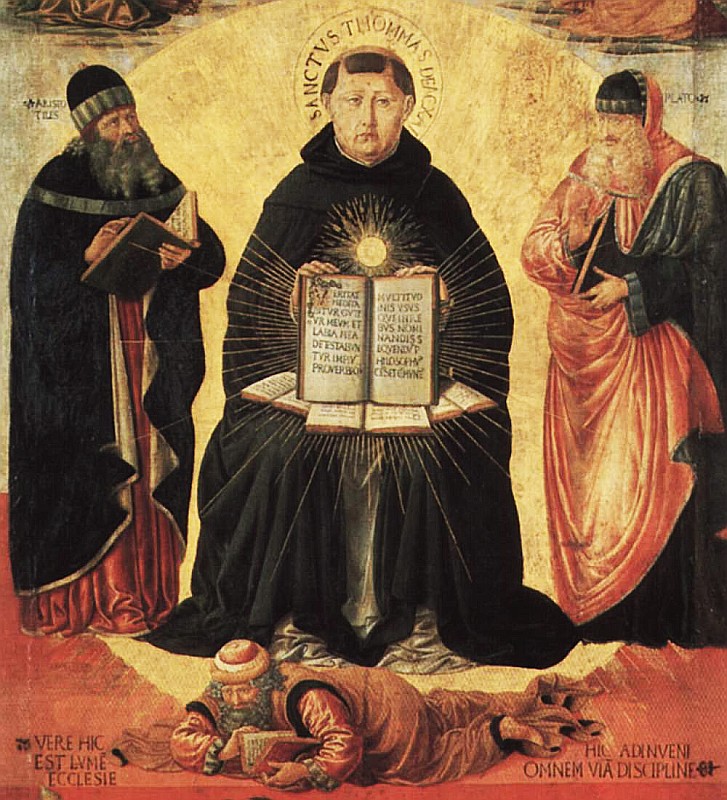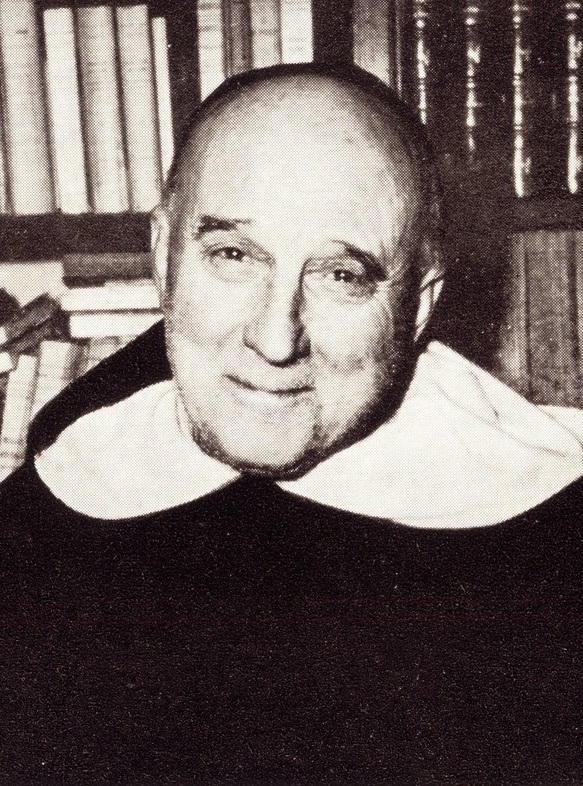Source: www.breviary.net
 | |
Absolutio: Ipsíus píetas et misericórdia nos ádjuvet, qui cum Patre et Spíritu Sancto vivit et regnat in sæcula sæculórum. R. Amen. | Absolution: May his loving-kindness and mercy assist us. Who, with the Father, and the Holy Ghost, liveth and reigneth, for ever and ever. R. Amen. |
V. Jube domne, (Dómine) benedícere. | V. Vouchsafe, Reverend Father (O Lord), thy blessing. |
Benedíctio 4: Deus Pater omnípotens sit nobis propítius et clemens. R. Amen. | Benediction 4: May God the Father Almighty shew us his mercy and pity. R. Amen. |
| Lesson iv | |
 Milan Cathedral | |
Ambrósius epíscopus Mediolanénsis, Ambrósii civis Románi fílius, patre Gálliæ præfécto natus est. In hujus infántis ore exámen apum consedísse dícitur : quæ res divínam viri eloquéntiam præmonstrábat. Romæ liberálibus disciplínis erudítus est. Post a Probo præfécto Ligúriæ et Æmíliæ præpósitus : unde póstea, ejúsdem Probi jussu, cum potestáte Mediolánum venit ; ubi, mórtuo Auxéntio Ariáno epíscopo, pópulus de successóre deligéndo dissidébat. Quare Ambrósius, pro offícii sui múnere ecclésiam ingréssus, ut commótam seditiónem sedáret, cum multa de quiéte et tranquillitáte reipúblicæ præcláre dixísset, derepénte púero Ambrósium epíscopum exclamánte, univérsi pópuli vox erúpit, Ambrósium epíscopum deposcéntis. | Ambrose, Bishop of Milan, was the son of another Ambrose, a Roman citizen, and was born when his father was Prefect of Gaul. A swarm of bees settled upon his face when he was in his cradle, which was considered an omen of his future eloquence. He received a liberal education at Rome. He was afterwards, under the Prefect Probus, made governor of Liguria and Aemília, and so came with authority to Milan. Auxentius, an Arian, who had been intruded into the Bishoprick of Milan, happening to die, the most violent disputes arose about the choice of a successor. Ambrose came to the church in his official capacity, and urged upon the contending factions, in a long and powerful speech, the necessity of keeping the public peace ; whereupon a child suddenly cried out, Ambrose, Bishop, and the whole assembly took it up, and unanimously called for his election. |
V. Tu autem, Dómine, miserére nobis. R. Deo grátias. | V. But thou, O Lord, have mercy upon us. R. Thanks be to God. |
 Mass is celebrated at Milan Cathedral according to the traditional Ambrosian Rite | |
R. Invéni David servum meum, óleo sancto meo unxi eum : * Manus enim mea auxiliábitur ei. V. Nihil profíciet inimícus in eo, et fílius iniquitátis non nocébit ei. R. Manus enim mea auxiliábitur ei. | R. I have found David my servant, with my holy oil have I anointed him. * My hand shall hold him fast. V. The enemy shall not be able to do him violence ; the son of wickedness shall not hurt him. R. My hand shall hold him fast. |
V. Jube domne, (Dómine) benedícere. | V. Vouchsafe, Reverend Father (O Lord), thy blessing. |
Benedíctio 5: Christus perpétuæ det nobis gáudia vitæ. R. Amen. | Benediction 5: May Christ bestow upon us the joys of life eternal. R. Amen. |
| Lesson v | |
 St. Ambrose became Bishop of Milan on the 7th day of December in the year of our Lord 374 | |
Recusánte illo et eórum précibus resisténte, ardens pópuli stúdium ad Valentiniánum imperatórem delátum est ; cui gratíssimum fuit, a se deléctos júdices ad sacerdótium postulári. Fuit id étiam Probo præfécto jucúndum, qui Ambrósio proficiscénti quasi divínans díxerat : Vade, age, non ut judex, sed ut epíscopus. Itaque cum ad pópuli desidérium imperatóris volúntas accéderet, Ambrósius baptizátus (erat enim catechúmenus) sacrísque initiátus, ac servátis ómnibus ex institúto Ecclésiæ órdinum grádibus, octávo die, qui fuit séptimo Idus Decémbris, episcopále onus suscépit. Factus epíscopus, cathólicam fidem et disciplínam ecclesiásticam acérrime deféndit ; multósque Ariános, et álios hæréticos ad fídei veritátem convértit, in quibus claríssimum Ecclésiæ lumen sanctum Augustínum Jesu Christo péperit. | Ambrose refused, and would not yield to their prayers, whereupon they carried their petition to the Emperor Valentinian. It was very pleasing to this Prince that those he had appointed as judges should be chosen Bishops, as also the Prefect Probus, who had, as it were prophetically, said to him when he appointed him, Go and govern them more like a Bishop than a Judge. When the will of the Emperor was added to the desire of the people, Ambrose yielded, and received Baptism (for hitherto he was only a Catechumen), Confirmation and Communion, and then the several Orders on successive days, till on the eighth day, which was the 7th of December, the weight of the Episcopate was laid upon his shoulders. Being made Bishop, he shewed himself a stout upholder of the Catholic faith, and the discipline of the Church, and turned to the truth great numbers of Arians and other heretics, and, among them, he begat in Christ Jesus that burning and shining light of the Church, Augustine. |
V. Tu autem, Dómine, miserére nobis. R. Deo grátias. | V. But thou, O Lord, have mercy upon us. R. Thanks be to God. |
 St. Augustine is baptized by St. Ambrose in the presence of his mother, St. Monica | |
R. Pósui adjutórium super poténtem, et exaltávi eléctum de plebe mea : * Manus enim mea auxiliábitur ei. V. Invéni David servum meum, óleo sancto meo unxi eum. R. Manus enim mea auxiliábitur ei. | R. I have laid help upon one that is mighty, I have exalted one chosen out of the people. *My hand shall hold him fast. V. I have found David, my servant, with my holy oil have I anointed him. R. My hand shall hold him fast. |
V. Jube domne, (Dómine) benedícere. | V. Vouchsafe, Reverend Father (O Lord), thy blessing. |
Benedíctio 6: Ignem sui amóris accéndat Deus in córdibus nostris. R. Amen. | Benediction 6: May God enkindle in our hearts the fire of his holy love. R. Amen. |
| Lesson vi | |
 Bishop Ambrose gives absolution to the Emperor Theodosius | |
Gratiáno imperatóre occíso, ad Máximum ejus interfectórem legátus íterum proféctus est ; eóque pœniténtiam ágere recusánte, se ab ejus communióne semóvit. Theodósium imperatórem, propter cædem Thessalonícæ factam, ingréssu ecclésiæ prohíbuit. Cui, cum ille David quoque regem adúlterum et homicídam fuísse dixísset, respóndit Ambrósius : Qui secútus es errántem, séquere pœniténtem. Quare Theodósius sibi ab eo impósitam públicam pœniténtiam humíliter egit. Ergo sanctus epíscopus pro Ecclésia Dei máximis labóribus curísque perfúnctus, multis libris étiam egrégie conscrípsit, ántequam in morbum incíderet, mortis suæ diem prædíxit. Ad quem ægrótum Honorátus Vercellénsis epíscopus, Dei voce ter admónitus, accúrrit, eíque sanctum Dómini corpus præbuit : quo ille sumpto, conformátis in crucis similitúdinem mánibus, orans, ánimam Deo réddidit prídie Nonas Aprílis, anno post Christum natum trecentésimo nonagésimo séptimo. | After the murder of the Emperor Gratian, Ambrose was sent as an ambassador to Máximus, by whom he had been slain, and, as he refused to repent, the Bishop renounced his communion. After the massacre which the Emperor Theodosius had commanded at Thessalonica, he refused to permit that Prince to enter a church. The Emperor pleaded that he was no worse than David, who had been guilty of adultery and murder, to which Ambrose answered him, As thou hast followed him in his sin, follow him also in his repentance. Then Theodosius humbly did public penance laid upon him by the Bishop. At length the Saint was worn out with his continual labour and care for the Church (for the which also he composed many excellent books), and foretold that the day of his death was at hand, though he had not then fallen into his last sickness. As he lay dying, Honoratus, Bishop of Vercelli, heard a voice from God three times crying to him that the hour of Ambrose's departure was come, whereupon he went to him quickly, and gave him the sacred Body of our Lord. When he had received it, the Saint, still praying, with his hands stretched out in the form of a cross, gave his spirit to God, upon the 4th day of April, in the year of Christ 397. |
V. Tu autem, Dómine, miserére nobis. R. Deo grátias. | V. But thou, O Lord, have mercy upon us. R. Thanks be to God. |
 The Tomb of St. Ambrose, Bishop of Milan | |
R. Iste est, qui ante Deum magnas virtútes operátus est, et omnis terra doctrína ejus repléta est : * Ipse intercédat pro peccátis ómnium populórum. V. Iste est, qui contémpsit vitam mundi, et pervénit ad cæléstia regna. R. Ipse intercédat pro peccátis ómnium populórum. V. Glória Patri, et Fílio, et Spirítui Sancto. R. Ipse intercédat pro peccátis ómnium populórum. | R. This is he who wrought mighty deeds and valiant in the sight of God, and all the earth is filled with his doctrine: * May his intercession avail for the sins of all the people. V. He was a man who despised the life of the world and attained unto the kingdom of heaven. R. May his intercession avail for the sins of all the people. V. Glory be to the Father, and to the Son, and to the Holy Ghost. R. May his intercession avail for the sins of all the people. |








No comments:
Post a Comment